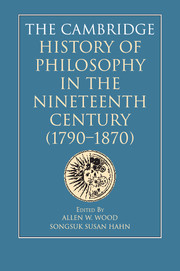Book contents
- Frontmatter
- Contents
- Contributors
- Preface
- Abbreviations
- Introduction
- I Philosophy in the Nineteenth Century
- II Logic and Mathematics
- III Nature
- IV Mind, Language, and Culture
- V Ethics
- VI Religion
- VII Society
- VIII History
- 26 Philosophizing about History in the Nineteenth Century
- 27 Philosophy of History
- 28 The History of Philosophy
- References
- Index
- References
27 - Philosophy of History
The German Tradition from Herder to Marx
from VIII - History
Published online by Cambridge University Press: 05 December 2012
- Frontmatter
- Contents
- Contributors
- Preface
- Abbreviations
- Introduction
- I Philosophy in the Nineteenth Century
- II Logic and Mathematics
- III Nature
- IV Mind, Language, and Culture
- V Ethics
- VI Religion
- VII Society
- VIII History
- 26 Philosophizing about History in the Nineteenth Century
- 27 Philosophy of History
- 28 The History of Philosophy
- References
- Index
- References
Summary
PHILOSOPHY OF HISTORY
The term “philosophy of history” was coined by Voltaire in the years 1756–65, between his Essay on Customs and his Philosophy of History. He explicitly identified it with responding to his mistress’s concern that history seemed to reveal nothing but a chain of human folly. As Voltaire and others saw it, the real matter of history was not politics, war, and conquest – the grim record that earlier generations had chronicled all too fully – but rather the constructive and creative enterprises of art, science, and industry. In contemplating human history, Enlightenment thinkers conceived reason as the antithesis of religious dogma and traditional authority that kept man in ignorance, superstition and subordination. Yet the Enlightenment found itself amassing considerable evidence that contradicted its prevailing assumption about the timelessness and ubiquity of its conception of reason, of its conception of morality, of its conception of political and cultural order. Ethnographic and historical evidence propelled the more candid among its thinkers to recognize that drastically different criteria of truth, order and value prevailed in different geographical and historical contexts. This variety undermined not only the linearity of the doctrine of progress but also the very idea that reason itself constituted a timeless and criterial certainty. How could Enlightenment history do justice to the majesty of a medieval cathedral or the wisdom of an American-Indian myth? How was it to assess the significance of anything not explicitly utilitarian? Myth, poetry, ritual, and custom – all seemed to Enlightenment historians to be so contaminated with unreason that no redemption was possible. They found in the historical record, case after case of the same follies and contradictions, irresolvable and ironic, and history seemed to confirm nothing so much as the utter misery of the human condition: division, suffering, disillusion and despair. Therewith most of the past became simply a scandal from which only the future could redeem man. History seemed, as Hume would have it, little more than the record of human folly.
- Type
- Chapter
- Information
- Publisher: Cambridge University PressPrint publication year: 2012



